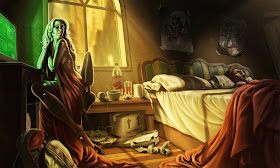Medicine shows (especially intergalactic medicine shows) have a lot of freaks. Over the coming weeks, months, and years, this blog will introduce you to a few of them. Well, maybe more than a few...
Friday, November 22, 2013
Thursday, November 21, 2013
IGMS Issue 34 & 35 now on Kindle and Nook, etc.
If you have a subscription, just go to your account page and select the version you'd like delivered.
Tuesday, November 19, 2013
Monday, November 18, 2013
Almost Ready: IGMS Issue 36
 "The
Light Crusader's Dark Deserts" is a rollicking adventure through the lands
of many kinds of death, right up to the point where the protagonist has to sit
down to dinner with his deceased wife and child, which answers several
necessary but unpleasant questions.
"The
Light Crusader's Dark Deserts" is a rollicking adventure through the lands
of many kinds of death, right up to the point where the protagonist has to sit
down to dinner with his deceased wife and child, which answers several
necessary but unpleasant questions.Editor, Orson Scott Card's InterGalactic Medicine Show
Thursday, November 07, 2013
Tangible Progress, by Edmund R. Schubert
For several years now I’ve been turning over in my mind an idea: a mythical race of people who trace their origins back to ancient Rome 
Of course, a series of novels will take years to write, and I wanted (needed, really) to start smaller, exploring these people and their lives, so I’ve begun writing several short stories set at different points in time. “Tangible Progress” is the first of these. I’m also working on one set in modern New York City, with some subtle but not unimportant difference. We’ll see which, if any of them, strike a chord with readers.
Regardless of the specifics, I also knew I wanted to start with the people, the Rem’n, but without the added baggage of werewolves. Werewolves are everywhere and, frankly, of limited interest to me. We’ve all seen plenty of werewolves during recent years, along with plenty of vampires and zombies. Even the first idea I had for writing about these people that was big enough to be a novel was actually set after the last werewolf had been killed. It seems odd, I know, even extreme, but I was fascinated by the idea of a werewolf-hunting people far more so that by the werewolves themselves.
As for Gabrielle and the gang in “Tangible Progress,” it took many 
I chose to set the story during the Great Depression because in addition to taking the werewolves out of the story, I also wanted to take the technology out of the story. I’m not sure that I can fully articulate why I wanted to do that, only that my instinct was to focus things as much as possible on people and nothing else. I suspect, however, that the time period is one I will revisit, regardless of which aspects of the mythology I am creating I choose to keep and which I choose to jettison. 1938 in particular is a year that intrigues me. So much happened that year, from the first Superman comic book and H.G. Wells radio “War of the Worlds” broadcast hoax, to Hitler’s invasion of Poland and the beginning of World War II.

On a much broader note, I also feel compelled to mention that although I am the editor of IGMS, I have not and never have, selected my own work for inclusion in the magazine. I’m not delusional enough to claim that my role here doesn’t play a part in getting published in our digital pages, but any time I have a story that I’d like to see published, it goes first to our managing editor, who them passes it along to Uncle Orson. I’m comfortable saying that if he didn’t think that the story was good enough, he would at least send me some notes and say “Fix this up before you embarrass us all.” ;-)
So that’s the story behind my story. I’m hoping there will be many more, but first and foremost, I hope you enjoy this one all by itself. It has quite a load to carry, bearing the weight of this writer’s hopes and dreams for many future projects.
-Edmund R. Schubert




